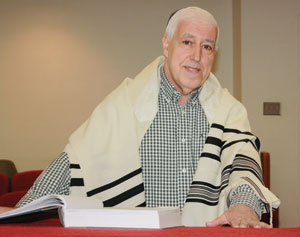 From the mellah (Jewish quarter) in Fez, Morocco, to Congregation Ohev Sholom, Charles Choucroun has had an interesting and varied life. But his deepest commitment is to Judaism. He shows it in a variety of ways including leading the morning minyan six days a week — Sunday through Friday — at his Conservative congregation for more than 20 years.
From the mellah (Jewish quarter) in Fez, Morocco, to Congregation Ohev Sholom, Charles Choucroun has had an interesting and varied life. But his deepest commitment is to Judaism. He shows it in a variety of ways including leading the morning minyan six days a week — Sunday through Friday — at his Conservative congregation for more than 20 years.
Ohev is recognizing Choucroun’s love of Judaism and his synagogue by presenting him with the Shem Tov (Good Name) Award at a brunch on Sunday, April 14. Choucroun is only the second person to be honored with this recognition. The first recipient was congregant Marvin Denton. The cost for the brunch is $18. RSVP to the synagogue office at 913-642-6460.
“He enriches the Jewish culture of the congregation in special ways through cuisine and the special events he initiated,” said Ohev’s Rabbi Scott White. “The reason he is getting the Shem Tov Award is for these contributions, which stand out beyond the average committed congregant.”
Ohev Sholom’s President Dr. Ace Allen endorses Rabbi White’s words, “Charles Choucroun exemplifies the ancient Jewish understanding of what comprises a good name: modesty, generosity, hard work, commitment to the community and excellence in everything he does.”
Choucroun left Morocco in 1961, five years after it declared its independence from France. First he went to France for a few months, then to Israel for 13 years, then back to France and finally to the United States. He ended up in Kansas in 1977 because one of his sisters and her husband lived here.
“After independence everything changed,” he said. “And we had to leave.”
Although he left the congregation of his childhood, Choucroun has brought his traditions to Ohev, where he has been a member for more than 25 years. Besides leading Ohev’s daily minyan, for which he davens in the Sephardic style, Choucroun also prepares the meals for festival kiddushes.
Rabbi White said Choucroun is one of the reasons the congregation eats well after festival services.
“In the past, he and his wife Susan have sponsored our Tu b’Shevat seder. Choucroun prepares a very elaborate meal for the seder, using some Sephardic cooking. This year almost 100 people attended. He single handedly pulls it together.”
He prepares casseroles, soups and side dishes. Rabbi White calls the food “very exciting.”
Choucroun is humble and somewhat embarrassed by the attention. He started helping with Kiddush because he felt it was important for the congregation to have a communal meal after services. As for leading services, he simply starting doing it because well over 20 years ago some of the “old timers asked me to help.”
He also reads Torah on Mondays, Thursdays and yom tovs, when the rabbi is not in town. He loves to read Torah and Haftarah. He always reads the Haftarah of Jonah on Yom Kippur.
One of the special rites he added to Ohev Sholom’s religious events is the inclusion of the Mimouna, an event held at the close Passover, which is very popular in Moroccan communities. People dress up in bridal white as well as costume. They eat Moroccan crepes dipped in honey, as the first bread after Passover. The table is set with symbolic foods: honey, buttermilk, fruit, sweets and greens. Guests are blessed with milk, whose whiteness symbolizes purity. The milk is sprinkled on their face and shoulders. Choucroun has been holding a Mimouna for about 10 years. But last year it was held in the synagogue.
“In the 25 years I’ve known Charles,” said Dr. Allen, “he has always been one of the first to volunteer his time, talents, and resources. He has always been a faithful minyanaire, prayer leader and Torah reader. He and his wife, Susan, have hosted innumerable Shabbat Kiddushes and celebrations of Purim and Mimouna. He’s the guy at KosherFest walking around with a platter of sample delicacies from Morocco that he’s made, with a beautiful smile on his face. He has special affection for older people, and in his profession as a hairdresser has provided free haircuts for people unable to afford them.”
Even with all the accolades, or perhaps because of who he is, Choucroun was surprised when the rabbi announced at services one morning that he was to be presented with this award. “I was very surprised,” he said. “I did not know that they even had a special award.”
“Everyone clapped and gave him a standing ovation,” his wife said.
Susan Choucroun is proud of what her husband does for the congregation. “I want people to know that he has an intrinsic and deep love for Judaism with every part of his being,” she added.
“It is how I was raised,” Choucroun responds.
“I want to be an example,” he added. “You must have the discipline to come to the service, instead of going to a football game. It is more important to come to services than to go to a concert or sport event. Synagogue should come first.”


